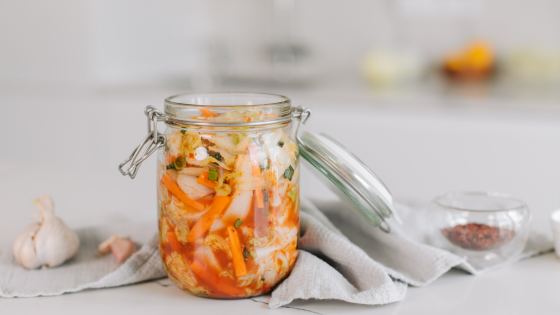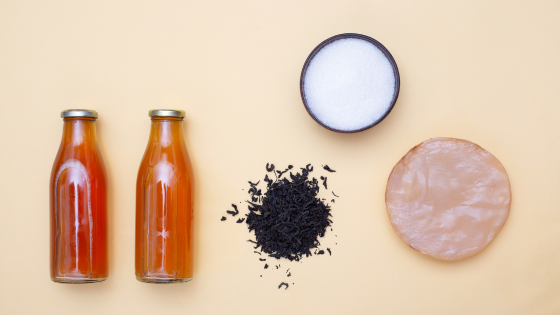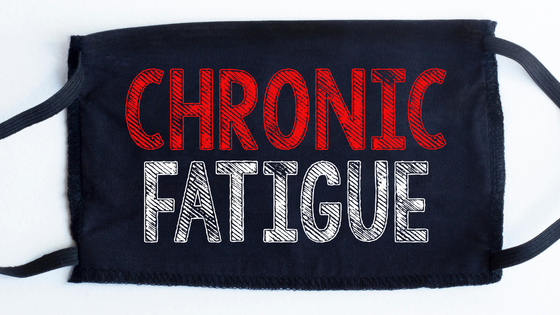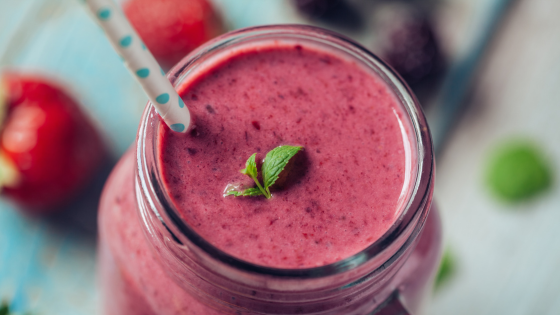Fermented foods have gained significant popularity in recent years, as people are becoming more aware of their numerous health benefits. From yogurt and sauerkraut to kombucha and miso, fermented foods offer a range of flavors and textures while providing a host of advantages for our overall well-being. In this blog post, we will explore the world of fermented foods, understanding what they are and why they have become such a trend.
What are Fermented Foods?
Fermented foods are a diverse group of foods that have undergone a natural process called fermentation. Fermentation is a metabolic process in which microorganisms, such as bacteria, yeast, or fungi, convert carbohydrates (such as sugars or starches) into alcohol, acids, or gases. The fermentation process preserves food and creates highly beneficial enzymes such as Omega-3 fatty acids, B vitamins, and several strains of probiotics. Natural food fermentation has also been shown to effectively preserve food nutrients and break down foods into forms that are easier to digest. This transformative process not only changes the flavor, texture, and aroma of the food but also enhances its nutritional profile and extends its shelf life.

Health Benefits of Fermented Foods
A. Improved Digestion
Fermented foods play a crucial role in promoting healthy digestion. The key to their digestive benefits lies in the presence of beneficial bacteria, often referred to as probiotics. These live microorganisms help restore and maintain a healthy balance of gut flora, aiding in the breakdown and absorption of nutrients.
- Role of beneficial bacteria in the gut: Fermented foods are teeming with beneficial bacteria such as lactobacilli and bifidobacteria. When consumed, these probiotics populate the intestines, supporting a healthy gut microbiome. This helps maintain a robust digestive system, leading to improved nutrient absorption, reduced bloating, and relief from digestive discomfort.
- Increased bioavailability of nutrients: Fermentation enhances the bioavailability of nutrients present in foods. During the fermentation process, enzymes produced by beneficial bacteria break down complex compounds into simpler forms that are easier for our bodies to absorb. For instance, the lactose in milk is broken down into lactic acid, making it more tolerable for individuals with lactose intolerance. Similarly, the phytic acid in grains and legumes is reduced, enhancing the availability of minerals like iron, zinc, and calcium.
B. Enhanced Immune Function
Fermented foods have been shown to have a positive impact on immune function, primarily through their influence on the gut microbiota—the diverse community of microorganisms residing in our digestive tract.
- Impact of gut microbiota on the immune system: The gut microbiota plays a crucial role in regulating our immune system. Beneficial bacteria in fermented foods help promote a healthy balance of gut microbiota, which, in turn, supports the proper functioning of our immune system. A strong and balanced immune system is better equipped to defend against harmful pathogens and reduce the risk of infections.
- Potential reduction in allergies and autoimmune diseases: Emerging research suggests that consuming fermented foods may have a protective effect against allergies and autoimmune diseases. The gut microbiota helps modulate immune responses, preventing excessive inflammation and hypersensitivity reactions that can lead to allergies. Furthermore, some studies indicate that the consumption of fermented foods may help regulate the immune system, potentially reducing the risk of autoimmune conditions such as rheumatoid arthritis and inflammatory bowel diseases.
C. Weight Management
Fermented foods can be beneficial for individuals seeking to manage their weight effectively. Let’s explore two ways in which fermented foods can contribute to weight management.
- Influence on satiety and food cravings: Fermented foods, particularly those rich in probiotics, have been found to enhance feelings of satiety, helping you feel fuller for longer. The beneficial bacteria in fermented foods produce short-chain fatty acids, which can signal to the brain that you’re satisfied and reduce the likelihood of overeating. Additionally, consuming fermented foods has been associated with a decreased desire for unhealthy, calorie-dense foods, potentially curbing cravings for sugary or high-fat snacks.
- Regulation of metabolism and body weight: Emerging evidence suggests that the consumption of fermented foods may play a role in regulating metabolism and body weight. Some studies have shown that certain strains of probiotics found in fermented foods can positively influence metabolic processes, such as the breakdown of dietary fats. Additionally, an imbalance in gut microbiota composition has been linked to obesity and metabolic disorders. By promoting a healthy gut microbiome, fermented foods may help support a healthy metabolism and contribute to weight management efforts.
D. Nutritional Value
Fermented foods not only offer unique flavors and textures but also provide a range of nutritional benefits. Let’s explore two key aspects of their nutritional value.
- Preservation of vitamins and minerals: The fermentation process can help preserve and enhance the bioavailability of vitamins and minerals present in foods. During fermentation, beneficial bacteria produce enzymes that break down complex nutrients into more easily digestible forms. As a result, fermented foods can be a valuable source of essential nutrients such as vitamins B and K, as well as minerals like iron, calcium, and magnesium. Additionally, the breakdown of certain compounds, such as phytic acid, by fermentation can increase the availability of minerals for our bodies to absorb.
- Production of beneficial compounds like probiotics and enzymes: Fermented foods are known for their content of beneficial compounds, including probiotics and enzymes. Probiotics are live microorganisms that confer health benefits when consumed. They promote a healthy balance of gut bacteria, improve digestion, support immune function, and may even have positive effects on mental health. Fermented foods such as yogurt, sauerkraut, and kimchi are rich sources of probiotics. Additionally, fermentation enhances the production of enzymes, which aid in the breakdown of food components, improving digestion and nutrient absorption.
Specific Fermented Foods and Their Benefits
A. Yogurt
Yogurt, a popular fermented food, offers a range of benefits for gut health and bone health due to its high probiotic content and calcium absorption properties.
- High probiotic content for gut health: Yogurt is renowned for its abundance of probiotics, which are live bacteria that provide numerous advantages to the digestive system. These beneficial bacteria, including strains like Lactobacillus and Bifidobacterium, play a vital role in maintaining a healthy balance of gut flora. By promoting digestion and reducing the risk of digestive disorders, regular consumption of yogurt supports a healthy gut microbiome. It enhances nutrient absorption and helps alleviate symptoms of conditions such as diarrhea, irritable bowel syndrome (IBS), and inflammatory bowel disease (IBD).
- Calcium absorption and bone health: Yogurt serves as an excellent source of calcium, a mineral crucial for the maintenance of strong and healthy bones. The fermentation process involved in yogurt production enhances the bioavailability of calcium, making it easier for the body to absorb and utilize this essential mineral. By regularly consuming yogurt, individuals can fulfill their daily calcium requirements and contribute to optimal bone health, reducing the risk of conditions like osteoporosis and fractures.
B. Sauerkraut and Kimchi

Sauerkraut and kimchi, both traditional fermented foods made from cabbage and seasonings, offer a wealth of benefits due to their rich content of beneficial bacteria and potential anti-inflammatory effects.
- Rich in beneficial bacteria: Through the natural fermentation process, sauerkraut and kimchi develop a diverse community of beneficial bacteria, particularly Lactobacillus species. These beneficial bacteria promote a healthy gut microbiota, which is essential for optimal digestion, nutrient absorption, and overall gut health. Consuming sauerkraut and kimchi can help support a balanced gut microbiome and contribute to improved digestive well-being.
- Potential anti-inflammatory effects: Sauerkraut and kimchi are packed with compounds that possess potential anti-inflammatory properties, including antioxidants and phytochemicals. These substances have been linked to reducing inflammation in the body, which is associated with various chronic diseases, including cardiovascular diseases, diabetes, and certain types of cancer. Incorporating sauerkraut and kimchi into your diet may provide anti-inflammatory benefits and support overall health.
C. Kombucha

Kombucha, a fermented beverage made from sweetened tea and a symbiotic culture of bacteria and yeast (SCOBY), offers a combination of probiotics and antioxidants for a range of potential health benefits.
- Probiotics and gut health: Kombucha is rich in probiotics, which are beneficial bacteria that support a healthy gut microbiome. These probiotics can improve digestion, enhance nutrient absorption, and promote a balanced gut environment. Consuming kombucha regularly can contribute to overall gut health and may alleviate digestive issues.
- Antioxidant properties: Kombucha contains antioxidants, such as polyphenols and vitamin C, which help protect the body against oxidative stress caused by free radicals. Antioxidants play a vital role in reducing inflammation, supporting the immune system, and promoting overall well-being. Regular consumption of kombucha can provide a source of these protective compounds.
- Detoxification and liver support: While limited scientific studies have explored kombucha’s detoxification properties, some research suggests that its antioxidants and beneficial compounds may assist in the body’s detoxification processes and support liver health. However, more research is needed to fully understand and confirm these potential benefits.
D. Miso and Tempeh
Miso and tempeh are plant-based sources of probiotics that offer numerous health benefits. These fermented soybean products provide valuable nutrients and contribute to improved digestion and heart health.
- Improved digestion and gut health: Miso and tempeh undergo fermentation, which helps break down complex nutrients, making them easier to digest and absorb. The probiotics present in miso and tempeh support a healthy gut microbiome, promoting optimal digestion and nutrient absorption. The consumption of miso and tempeh can help alleviate digestive issues and enhance overall gut health.
- Heart health support: Miso and tempeh contain plant-based proteins, fiber, and isoflavones, which have been associated with potential cardiovascular benefits. The fiber content in both miso and tempeh can aid in managing cholesterol levels and promoting heart health. Isoflavones, found in soybeans, have shown potential in supporting healthy blood vessel function and reducing the risk of heart disease.
E. Kefir
Kefir is a fermented milk drink with a tangy flavor and a creamy consistency. It is made by fermenting milk with kefir grains, which consist of a combination of bacteria and yeast. Kefir offers its unique set of benefits for overall health and well-being.
- Diverse probiotic profile for gut health: Kefir contains a broad spectrum of beneficial bacteria and yeasts, providing a diverse array of probiotics. This diversity can be advantageous as it introduces a wider range of strains to support gut health. The probiotics in kefir can help improve digestion, promote a healthy gut microbiome, and support immune function.
- Enhanced nutrient absorption and immune support: The fermentation process of kefir helps break down lactose (milk sugar), making it more easily digestible for individuals with lactose intolerance. Additionally, kefir’s probiotics can enhance nutrient absorption, particularly for minerals like calcium and iron. The consumption of kefir has also been associated with immune-boosting properties, potentially reducing the risk of infections and supporting overall immune function.
How to Incorporate Fermented Foods into Your Diet
A. Tips for choosing quality fermented products:
- Look for products with live and active cultures: Check the label to ensure that the fermented food you’re purchasing contains live and active cultures or probiotics. This ensures that you’re getting the beneficial bacteria that offer health benefits.
- Choose traditionally fermented foods: Opt for fermented foods that are made using traditional fermentation methods and natural ingredients. Avoid those that contain excessive additives, preservatives, or high levels of sugar.
B. Easy ways to incorporate fermented foods into meals:
- Add yogurt or kefir to smoothies: Blend yogurt or kefir with fruits and vegetables to create a nutritious and probiotic-rich smoothie.
- Use sauerkraut or kimchi as toppings: Sprinkle sauerkraut or kimchi on top of salads, tacos, or sandwiches to add a tangy flavor and probiotic boost.
- Enjoy kombucha as a refreshing beverage: Sip on kombucha as a refreshing and healthy alternative to sugary drinks. It can be enjoyed on its own or mixed with fruit juices or sparkling water for added flavor.
C. DIY fermentation: a beginner’s guide:
- Start with simple recipes: Begin your fermentation journey with simple recipes like homemade sauerkraut or yogurt. These recipes typically require minimal ingredients and equipment.
- Follow proper hygiene practices: Ensure that your utensils, jars, and hands are clean before starting the fermentation process to prevent the growth of harmful bacteria.
- Learn about fermentation techniques: Research and familiarize yourself with various fermentation techniques, such as brine fermentation or milk fermentation, depending on the food you want to ferment.
D. Potential side effects and precautions:
- Start slowly: If you’re new to consuming fermented foods, start with small amounts and gradually increase your intake to allow your body to adjust to the changes in gut bacteria.
- Monitor for any adverse reactions: While fermented foods are generally safe for consumption, some individuals may experience digestive discomfort or allergies. If you notice any adverse reactions, such as bloating, gas, or skin irritation, consult a healthcare professional.
Conclusion
Fermented foods offer a multitude of benefits that can enhance your overall health and well-being. We have explored how fermented foods improve digestion by introducing beneficial bacteria and increasing nutrient bioavailability. These foods also support immune function, potentially reducing the risk of allergies and autoimmune diseases. Additionally, fermented foods contribute to weight management by promoting satiety and regulating metabolism.
Specific fermented foods like yogurt, sauerkraut, kimchi, kombucha, miso, tempeh, and kefir each provide unique advantages. Yogurt provides high probiotic content and aids in calcium absorption for bone health. Sauerkraut and kimchi are rich in beneficial bacteria and may have anti-inflammatory effects. Kombucha offers probiotics and antioxidants, potentially supporting detoxification and liver health. Miso and tempeh serve as plant-based sources of probiotics, benefiting digestion and heart health.
To incorporate fermented foods into your diet, follow tips for choosing quality products, find creative ways to include them in your meals, and consider experimenting with DIY fermentation. Start slowly and monitor your body’s response to ensure a smooth transition. Be aware of potential side effects and consult a healthcare professional if needed.
I encourage you to make fermented foods a regular part of your daily diet. These foods not only provide numerous health benefits but also add variety and deliciousness to your meals. Embrace the versatility of fermented foods and explore the exciting world of flavors they offer. Whether you enjoy a bowl of yogurt with fresh fruits, a tangy sauerkraut topping, or a refreshing glass of kombucha, fermented foods can play a valuable role in supporting your overall health and culinary enjoyment.
If you are looking for more tips and support, join me over on my group page, The Village – A Natural HEALing Community, to get tons of information and tips to help you take your HEALTHY EATING and ACTIVE LIVING to the next level.
REFERENCES
- “The Role of Fermented Foods in Digestive Health: Gut Microbiota and Beyond.” Nutrients, 2019, 11(10), 2277. https://www.ncbi.nlm.nih.gov/pmc/articles/PMC6835901/
- Marco, Maria L., et al. “Health Benefits of Fermented Foods: Microbiota and Beyond.” Current Opinion in Biotechnology, 2017, 44, 94-102. https://www.ncbi.nlm.nih.gov/pmc/articles/PMC5390821/
- Chilton, Stephanie N., and Raúl E. Cachau. “Fermented Foods, the Gut Microbiome, and Mental Health: A Mechanistic Overview with Implications for Depression and Anxiety.” Nutritional Neuroscience, 2020, 23(11), 799-829. https://www.ncbi.nlm.nih.gov/pmc/articles/PMC7150760/
- Selhub, Eva M., et al. “Fermented Foods, Microbiota, and Mental Health: Ancient Practice Meets Nutritional Psychiatry.” Journal of Physiological Anthropology, 2014, 33(1), 2. https://www.ncbi.nlm.nih.gov/pmc/articles/PMC3904694/
- Marco, Maria L., et al. “Health Benefits of Fermented Foods: Microorganisms and Beyond.” Current Opinion in Biotechnology, 2017, 44, 94-102. https://www.ncbi.nlm.nih.gov/pmc/articles/PMC5390821/
- Harvard T.H. Chan School of Public Health. “Fermented Foods.” https://www.hsph.harvard.edu/nutritionsource/food-features/fermented-foods/
- “The Role of Fermented Foods in Cardiovascular Diseases: A Review.” International Journal of Food Sciences and Nutrition, 2020, 71(1), 1-11. https://www.ncbi.nlm.nih.gov/pmc/articles/PMC7032789/





+leave a comment . . .